#metoo science
Explore tagged Tumblr posts
Text
UCSF: nouvelle plainte contre le Pr Stanton Glantz pour harcèlement sexuel et discrimination raciste
Lundi 26 mars, une nouvelle plainte a été déposée devant la Cour Supérieure du Comté d’Alameda pour harcèlement sexuel, discrimination raciste et des fraudes académiques attenantes contre le Pr. Stanton Glantz, de l’Université de Californie San Francisco (UCSF). Cette fois-ci, la plaignante est une jeune femme d’origine amérindienne révèle le San Francisco Examiner. Après près de trois ans à…

View On WordPress
0 notes
Text
On why women’s rage is a superpower
My mother hates my new book. I gave her a proof just a few days ago, and although she’s still only halfway through, she can’t wait to tell me all the ways in which she hates my novel.
“Is this science fiction?” she says. (She detests science fiction.) “Were you ill when you wrote this?” (I was.) And repeatedly, she says: “Why are the women so angry?”
I get it. She’s out of her comfort zone. At 83, with no internet, no interest in pop culture and a deep-rooted hatred of anything close to horror or the supernatural, she wasn’t my target audience. And yet it’s never easy to hear such criticism from a loved one. But in some ways, she isn’t wrong. Broken Light is an angry book. It came from a time of lockdown, when social media was my only window onto the world. It came from a place of trauma, when I was fighting cancer. It came from a place of corrupt hierarchies, self-serving politicians, anti-vaxxers, Covid deniers, victim-blamers, and those eager to blame all their woes on minorities. And of course, it arose against the background of the #MeToo campaign and the Sarah Everard murder – a murder that shocked the nation, not least because the murderer turned out to be a serving police officer with a reputation for sexual misconduct - which unleashed a collective howl of protest, as well as an ugly, misogynistic backlash. Even so, my story came as something of a surprise to me: the story of a woman’s rage, and, on reaching the age at which women often feel least valued, her coming into her power.
It surprised me, most of all because I wasn’t an angry person. At least, I didn’t think I was. Those who know me describe me as someone who tends to flee conflict, who generally tries to find common ground, who gets upset when people fight. And yet, writing this story, I found myself saying and feeling certain things on behalf of my heroine, Bernie Moon; things I might not have said for myself, but which felt right and urgent, and true, and strangely liberating.
Anger has a bad press. A woman’s anger, especially. While men are encouraged to express feelings of justified anger, women are often criticized when they try to do the same. Angry women are often portrayed as “harpies,” “banshees,” “Furies.” It suggests that a man’s rage is righteous, but that a woman’s is unnatural, making her into a monster. Male anger is powerful. The God of the Bible is one of wrath. Seldom is he ever portrayed as expressing any other emotion. In the same way, men and boys are often led to believe that expressing emotion is weak - except for anger, which is seen as acceptably masculine.
In comparison, women are often criticized when they show aggression. Angry women are hysterical, shrill, out of control, unreliable, unattractive, unfeminine. A perceived lack of “femininity” makes a woman less valuable, less worthy of respect and of protection. The Press coverage of women victims of violence is a case in point. A victim of violence needs to be attractive, white, gender conforming and virtuous in every way if she is not to be overlooked, or worse, portrayed as somehow having contributed to her misfortune. When trans teenager Brianna Ghey was stabbed, the Press were very quick to state that her murder was not thought to be a hate crime, whilst at the same time obsessing over – and questioning - her gender. When Nicola Bulley disappeared, police felt obliged to divulge details of her struggle with the menopause, as well as her alcohol issues, even though this was privileged information and of no public relevance. When Emma Pattison, the Head of Epsom College, was murdered alongside her daughter, the Press immediately assumed that her husband George must have felt “overshadowed” and “driven to distraction” by his wife’s prestigious job. In all three cases, the victim falls under the hostile scrutiny of the Press, while the perpetrator is given an excuse. In all three cases, the victim – one trans, one hormonal, one better-paid than her husband - is effectively portrayed as “unnatural”. Subtext: Unnatural women do not deserve the protection of the patriarchy. Unnatural women come to bad ends.
Once you start to acknowledge it, rage grows at a surprising rate. Over the past three years, I have found myself growing increasingly angry. Angry at the injustices committed by our Government; t the greed of corporations; angry at the prejudice extended to those who are different.
Connecting with others on social media has made me more aware of the lives and experiences of those from different backgrounds to mine, and with different levels of privilege. For a long time I’d been resistant to calling myself a feminist. Feminists are angry, I thought. What right have you to be angry?
Growing older, I realize that this was my mother speaking. A woman of a certain generation, who although she was aware of the challenges of living in a patriarchy, still had a level of privilege that many women do not share. White, professional, cishet women can sometimes have the luxury of choosing not to be angry. White, professional, cishet women can sometimes have the illusion of equality. But feminism isn’t only for just one kind of woman. A feminist must look beyond the limits of their own experience. And that’s where the anger really starts: anger at injustice; anger at corruption and lies. Most of all, anger at the prejudice against certain people for just being themselves; for being transgender, or Black, or old, or simply not conforming to what a white, patriarchal society expects and values. And once you start seeing injustice, you start to see it everywhere. It’s like an eye, which, once opened, cannot unsee inequality.
My anger flourished in lockdown. A time of growing divisions. Masks are invaluable in a pandemic, and yet they inhibit connection. They serve as a kind of reminder of who can speak, and who is to be silenced. While Boris Johnson was urging the public to trust the police, a vigil for Sarah Everard was broken up, with violence, by officers citing lockdown laws. While elderly people were dying alone; while I drove for four hours just to go for a half-hour walk in the park with my son; while I sat alone in my chemo chair, politicians were partying. Billionaires were enriching themselves. Behind the mask, the eye opened wide. I caught myself making faces behind my disguise at strangers. There was something weirdly liberating about this; as if, behind the piece of cloth, I could express myself at last. Not unlike writing a book, in fact. On screen, the eye opened wider. Bernie Moon, my heroine, was unlike like me in many ways, and yet anger connected us. The anger that comes from helplessness; from seeing others mistreated. Anger at a society that propagates inequality. And the anger that comes from hormones – those mood-altering chemicals that everyone produces, and yet which allegedly make women erratic; unreliable; hormonal.
In his novel, Carrie, Stephen King tells the story of a girl, whose telekinetic powers are unleashed by her teenage hormones. Carrie is unpopular, bullied, isolated. Her rage finds an outlet in her power. Driven to breaking-point by the bullies, she becomes a monster. Of course she does: after all, the author of this tale is a man, writing from the perspective of a couple of thousand years’ worth of patriarchal inheritance. In literature, a woman’s anger is unnatural; monstrous. It leads to terrible, unnatural things: makes murderers and infanticides of Clytemnestra and Medea; monsters of Medusa and Scylla. Unnatural, monstrous women are always punished in literature, even while acknowledging that they are often the victims of men. And unnatural women are often seen as physically repulsive – a reminder that, to be valued and loved, women must be young, and pure, and conform to the standards of beauty set out by their society. In literature, just as in life, those women who do not conform tend to be less valued, less seen, and when they do appear, do so as wicked witches, evil stepmothers, ugly crones and hideous travesties of womanhood.
But what would happen if a woman took control of the narrative? In recent years, we have observed a number of retellings of Greek myths from the point of view of the monster. Stone Blind, by Nathalie Haynes; Medusa, by Jessie Burton; Circe, by Madeline Miller. In both cases, the monstrous woman is seen from a different perspective; her rage absorbed and justified; her narrative reclaimed from a patriarchy that seeks to tame and subdue a woman’s rage, even at the cost of her life.
My new novel, Broken Light, comes from the same process of reclamation. It owes a debt to Carrie, but I have avoided the explicitly paranormal theme of the original, as well as the girl-on-girl bullying and the psychopathic mother. In my version, Carrie lives; marries her childhood sweetheart; internalizes all her rage and suffocates her power. Until the menopause – a topic which until recently has been largely misunderstood and taboo – at which point her power returns, and with it, a new kind of freedom. Freedom from the male gaze; from the responsibilities of motherhood; from the largely impossible expectations of society. Unlike puberty, menopause is triggered by a lack of certain hormones; and yet the symptoms can be just as dramatic and isolating. Loss of libido, exhaustion, depression, emotional outbursts as well as unpredictable and alarming hot flashes – my version of Carrie’s pyrokinesis. Whether my heroine’s powers stem from any kind of paranormal source is very much up to the reader to decide – after all, paranormal is only a step away from unnatural. And what counts as unnatural is in the eye of the reader – an eye that has been opened, I hope, to a series of new possibilities.
One is that rage is natural. Living in a patriarchy, women have a right to their rage. In fact, it seems more unnatural to me when women are not angry, given how much misogyny remains in our society. And growing old is natural. Being hormonal is natural. Differences are natural; so are disabilities. All women matter; whatever their age, or colour, or sexual orientation, or marital or reproductive status. The value of a woman’s life should not be defined by her popularity, or her age, or her looks, or her kids, or her value to the patriarchy. And no-one else gets to decide what a woman ought to be. A woman is not what, but who - a person, not an object; an active participant in her world. Women have lived too long behind the mask. They deserve their own stories. Stories in which they are allowed the full range of human possibility. So, to answer my mother’s question: Why are the women so angry?
Because it’s a superpower.
619 notes
·
View notes
Text
Dan Rather at Steady:
Of all the complaints, grievances, and gripes coming from the White House, the great majority have been directed at an aspect of 21st century America that Donald Trump just can’t seem to handle: diversity, equity, and inclusion. These three words tie him in knots. DEI raises his IRE. Several of the executive orders he’s signed since taking office are aimed at eliminating DEI programs within the federal government, in education, and in the private sector. Trump has weaponized DEI in the ever-worsening culture wars. It has become the go-to for killing any program that enables a diverse workforce or student body, studies underserved communities, or tackles institutional bias. He also uses it to absolve himself. Midair collision? Blame DEI.
For Trump, rooting out any and all DEI is fulfilling a campaign promise to end “wokeness” and “leftist indoctrination” in education. Some might call it a blanket excuse to blow up programs he doesn’t like. Just tag it DEI and be done with it.
This White House wants everything to be “merit based.” Trump has convinced his supporters that DEI stands for “didn’t earn it.” This is hypocrisy, especially when you consider some of his Cabinet appointments. Secretary of Defense Pete Hegseth pretty much kills their argument for merit-based hiring. Let’s take a step back for what’s known in television as the wide shot. Here’s what this is really all about: white men whining. You can’t call it a dog whistle, because that would suggest Trump is trying to hide his derision for DEI. He is not. His executive orders are announcing that it is open season to be brazenly, unapologetically racist, sexist, homophobic, ageist, xenophobic, ableist — pick your bigotry. The MAGA backlash to DEI is an outgrowth of the identity politics that have taken a greater hold in the United States over the past 10 years. The reaction has been building for a while but has recently grown deeper and stronger.
The 2015 Supreme Court decision legalizing gay marriage could be seen as the start. The #MeToo movement, which was partly a response to revelations about Harvey Weinstein’s sexual misconduct, took hold in 2017. The police killing of George Floyd spurred the Black Lives Matter movement in 2020. White males have had a disproportionate share of power in the United States since its founding. But the country’s demographics are changing, with the U.S. becoming less white. In the year 2000, 69% of the population was white; just 20 years later, that percentage was down to 58%. The group making the biggest population gain is Latinos. Is it any wonder Trump still wants to build that wall on the Mexican border? And recent trends will continue. According to the U.S. Census Bureau, white people may still be a plurality but no longer a majority in America by 2045. Trump is desperately trying to stop the clock, and even reverse it, with his executive orders.
So far the orders have:
Put all government DEI employees on administrative leave and ordered each federal agency to eliminate their positions.
Ended all diversity programs in the U.S. military and federal agencies.
Rescinded a 1965 executive order prohibiting racial discrimination in federal contracts.
Directed his Cabinet secretaries to “prepare up to nine civil investigation targets” along with “other strategies to encourage the private sector to end illegal DEI discrimination and preferences.”
Required all federal contractors to eliminate DEI programs, which includes all grant recipients.
Cumulative far-right outrage over programs seen as helping and promoting people of color, women, the LGBTQ+ community, and immigrants, combined with the fear of straight white men losing status and power, has brought us to this crossroads.
[...] Trump’s anti-DEI bent is more than a bigoted policy. It is anti-science, anti-education, and anti-American. The country cannot afford to have this covered over or forgotten.
Love this column from Dan Rather: Donald Trump’s war on DEI isn’t about “merit”, but about protecting White male entitlement who see their standing threatened.
#Donald Trump#Patriarchy#White Male Entitlement#White Male Privilege#White Priivilege#White Entitlement#Trump Administration II#DEI#Diversity Equity and Inclusion#Dan Rather
22 notes
·
View notes
Text

Project2025 #CorpMedia #Oligarchs #MegaBanks vs #Union #Occupy #NoDAPL #BLM #SDF #DACA #MeToo #Humanity #FeelTheBern
JinJiyanAzadi #BijiRojava Raqqa largely liberated, Rojava revolution holds commune elections [UPDATES]
The flags of the Women’s Protection Units (YPJ) and Shengal Women's Units (YJS) were planted in the city centre of Raqqa, which had been the capital city of ISIS, on September 14…

RELATED UPDATE: Şîrîn Mihemed serves the Rojava Revolution with her pen and voice

RELATED UPDATE: Lessons From Rojava for the Paradigm of Social Ecology

RELATED UPDATE: SDF arrests ISIS leader in Raqqa

RELATED UPDATE: Kongra Star expresses solidarity with the resistance of women in India

RELATED UPDATE: Kurdish activist Kenan Ayaz sentenced to 4 years and 3 months in prison in Germany

RELATED UPDATE: American troops, Syrian Democratic Forces capture ISIS leader behind prison break

RELATED UPDATE: [VIDEO] US captures ISIS leader in Syria
https://thehill.com/policy/international/4859156-us-captures-isis-leader-in-syria/

RELATED UPDATE: 5th Children's Festival continues in Raqqa
FURTHER READING:
15 notes
·
View notes
Note
i’m curious if you’re comfortable answering what places have you branched out to besides the atlantic as you’ve moved further left???
so this is hard to answer, because you can't just go to one source. i didn't just replace the atlantic with a single other publication, i just outgrew it.
anyway, i read A LOT. i've always been interested in issues of gender, inequality, prejudice, even before i knew what they were called. so beyond resources, i encourage you to read a lot, read from many different sources, and read critically. it is up to you to distill the truth from fiction, opinion from fact. also, you must think critically. you have to take the information and apply it, let it challenge you, let it stack up in your brain until you have convictions that you can actually justify.
🚨 also, disclaimer: i do not endorse EVERYTHING these publications or sites have printed. i don't co-sign every opinion these activists hold. i am sorry if i am ignorant to some crime against humanity within! i'm certain all the resources here are considered "problematic" or biased in some way, or to someone. some publications serve corporate interests, some have problematic business practices, some writers have problematic histories, and some of the info will challenge your worldview in a way that might seem harmful and cause you to deem them problematic. 🚨
mainstream news is still essential to stay aware of what's going on in the world (al jazeera, npr, cnn, to name a few) -- but these are some of the corporate interests i was talking about. they're biased, heavily, but sadly can't think of a news site that covers world news that isn't somehow beholden to their corporate overlords.
magazines, such as: mother jones, the nation, tempest, jacobin, dissent, inverse (for science) -- some of these are socialist publications. some, like mother jones, do excellent investigative reporting. you must know the difference between that and editorial - they are all valuable, but they aren't interchangeable. you will find a lot of editorials/opinions here, and you should assume any of them are owned by a bigger company and might be subject to their interests.
a selection of books i've loved at various times in my life: "aint i a woman? Black women and feminism" and "feminist theory" by bell hooks; "revolution and evolution" by grace lee boggs; "so you want to talk about race?" by ijeoma oluo; "bad feminist" by roxane gay; "unpacking the invisible knapsack" by peggy mcintosh; the publications of jackson katz, who researches what we now call toxic masculinity.
i also follow a lot of activists/thinkers, such as:
ericka hart - sexuality and Black history educator
tarana burke - founder of the metoo movement, Black feminist activist
laura danger - discusses domestic labor and gender inequality in relationships, and how global inequality creates it
megan jayne crabbe - writer and body positivity activist
ijeoma oluo - activist and author of "so you want to talk about race?"
abolition notes - not an activist, but a resource for educational material
following magazines and activists is probably the "easiest" solution, because you can expose yourself over time. read articles as they interest you, don't look away when activists say something that initially seems too extreme. idk! hope this helps!!
#recs#turning off rbs for now because i don't know if i want this to escape containment#socio#politics
14 notes
·
View notes
Note
I was re-reading your Whatever Happened to MeToo piece, and I still agree with most of it. I was wondering if you've ever read the original babe.net article detailing the assault allegation against Aziz Ansari?
https://babe.net/2018/01/13/aziz-ansari-28355
The woman's account includes not just "bad sex" but instances of him continuing to make physical contact with her even after she turned away or got up and walked away, multiple times. There are quotes like “He really kept doing it after I moved it away," and "But the main thing was that he wouldn’t let her move away from him."
I'm also not certain that the court of public opinion has acquitted him. For example there's this top comment from an r/Fauxmoi post about him: https://www.reddit.com/r/Fauxmoi/comments/13nx7tz/aziz_ansaris_good_fortune_suspended_indefinitely/
I hope this isn't too nitpicky. I know you highly value accuracy and that you champion a strongly feminist perspective. If you don't feel like discussing this topic I understand, but I was wondering if you think that individual instances described in the article constitute assault?
Basically, I don't think what Ansari would count as assault in any court of law (any amount of he-said/she-said pretty much guarantees it) but I still would warn women off dating him, if that makes sense.
It's not a perfect science but it is what it is.
3 notes
·
View notes
Note
Do you have a favorite character relationship, platonic or romantic, that’s your favorite to write purely from an author format?
I feel like I’m wording this terribly, but I know for me personally, my favorite relationships to read and write from like… a fandom perspective based on what I ship? is different than the relationships that are interesting to me as an author, because trying to figure out how characters interact, trying to capture their relationship and banter and dialogue and mannerisms, I find in some ways is more fun and interesting and dynamic to write over even some of my absolute favorite relationships, because with my favorites, I read and write them so much that I’m very comfortable with them and sometimes it’s nice to know that I’m just able to go for it and write them because I trust my internal instinct about how to write them and how they act and talk.
But the ones that are more challenging to explore or more unique are in many ways almost more interesting to write, they scratch that author itch when I can pull them off, and especially enjoy.
Like, there’s the things fandom author me enjoys, and things literary author me enjoys, and while there’s a LOT of overlap I have different preferences and favorites on both sides
And honestly I think this goes for ALL writing, not just necessarily relationships? So yeah, there’s the question and I’m so sorry for the rambling, but what would you say are your favorite things and relationships and plots etc to write as a fandom author, and favorite ones as a literary author? I’m happy to try to explain more if I’m being confusing. Words. Hard. Sorry
Are you asking in terms of abstracts (i.e. overall character types/dynamics/broad themes) or specifics (i.e. actual characters/ships from particular media properties)? In general for fandom, I have certain tropes and dynamics that I gravitate toward: i.e. Trashy Garbage Man Falls For Tiny Fierce Woman Who Doesn't Take His Bullshit; Sunshine and Grumpy (any combination thereof); Stupid Homosexuals are Stupid and Cannot Communicate, Cause Problems for Themselves; Now With Even More Literal Centuries of Pining God They're So Fucking Stupid, and more. Most of my favorite and long-term ships, such as Garcy, Fivan, Dreamling, etc. fall into one or more of these categories. I also particularly enjoy or have enjoyed writing Flynn (Timeless), Hob (Sandman), Ivan (Shadow and Bone), and their associated relationships, for various reasons. I know all of their characters well and they give me joy, so it's easy to slip into their POV, create scenarios or headcanons, and put them in various settings and give them problems. So there's that.
In terms of my original stuff, I am much more experimental and interested in a broader range of styles and outcomes. When you're writing fic, you are usually heading toward a certain ending (a happy ending for the blorbos after various tribulations), and I therefore have a certain writing style for fic that reflects that. My original fiction is different and in some ways considerably darker, and pushes character boundaries, plotlines, and interactions beyond what you'll normally see in my fic. For example, I have two currently finished original novels that (and I KNOW I have said this before) I should just quit procrastinating on and publish, especially since I badly need the money. One of them, The Wives, is a dark feminist murder-version of #MeToo with an unreliable and extremely feral female narrator. The other, Wormwood, is an alternate-history science fiction saga that is a combination of The Man in the High Castle and Chernobyl. They're both considerably different from each other in tone, style, and character relationships, and they represent more experimentation, complicated morality, and plot conflict than is generally reflected in my fics, because long-form fandom writing is one kind of thing and original long-form writing is another. So hey.
I likewise am currently working on an original version of my fic The Key of Solomon, entitled The Empire of Bones, which is an epic ensemble political-magical fantasy set in a historically inspired world. @silverbirching has read Part 1 and very much enjoyed it, so I am hoping to finish that one sometime in the new year (probably not sooner, but we will see?) It is likewise quite different from The Wives and Wormwood, and will (I hope) readily appeal to fans of my fics, because it preserves some of the same themes, styles, and character dynamics, while also including a ton of original stuff, extensive world-building, and new plots, themes, and content.
Thanks for the question!
17 notes
·
View notes
Text
This day in history
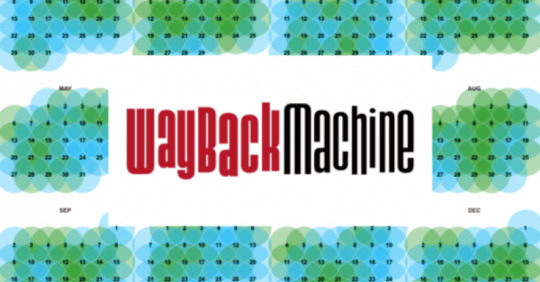
MERE HOURS REMAIN for the Kickstarter for the audiobook for The Bezzle, the sequel to Red Team Blues, narrated by @wilwheaton! You can pre-order the audiobook and ebook, DRM free, as well as the hardcover, signed or unsigned. There’s also bundles with Red Team Blues in ebook, audio or paperback.

#20yrsago Tablature for Super Mario Brothers https://artport.whitney.org/gatepages/artists/galloway/
#20yrsago Unix as she is spoke https://web.archive.org/web/20040215071845/http://www.eeng.brad.ac.uk/help/.faq/.unix/.pronun.html
#15yrsago Comprehensive excoriation of ebook stupidity https://arstechnica.com/information-technology/2009/02/the-once-and-future-e-book/
#15yrsago Disneyland Paris’s smoking area/stroller rental https://www.flickr.com/photos/doctorow/3246021936/
#10yrsago Marx’s prescient predictions for the 21st century https://www.rollingstone.com/music/music-news/marx-was-right-five-surprising-ways-karl-marx-predicted-2014-237285/
#10yrsago UK Parliament considers allowing secret courts to issue orders to seize reporters’ notebooks https://www.theguardian.com/media/2014/jan/31/secret-hearings-police-journalists-deregulation-bill
#10yrsago Massive collection of Soviet wartime posters https://windowsonwar.nottingham.ac.uk
#10yrsago Toronto Mayor Rob Ford ticketed, allegedly for public intoxication, in Vancouver https://globalnews.ca/news/1122528/breaking-rob-ford-reportedly-ticketed-in-vancouver-for-jaywalking/
#10yrsago Neil Gaiman reads “Green Eggs and Ham” https://www.youtube.com/watch?v=TKh_WOfxkA4
#5yrsago After #MeToo, whole industries have been blacklisted by insurers for sexual harassment liability coverage https://theintercept.com/2019/02/02/workplace-harassment-insurance-metoo/
#5yrsago Women weren’t excluded from early science fiction: they were erased https://www.wired.com/2019/02/geeks-guide-history-women-sci-fi/
#5yrsago Delayed, not saved: Foxconn’s Wisconsin “factory” announcement is a bid to help Trump save face https://www.cbsnews.com/news/foxconn-says-it-will-build-wisconsin-factory-after-all-citing-conversation-with-trump/
#5yrsago The plane(t) has been hijacked by billionaires, and we’re all passengers https://www.businessinsider.com/anand-giridharadas-billionaires-inequality-interview-2019-1
#5yrsago No Deal Brexit will lead to “putrefying stockpiles of rubbish” and “slurry” https://www.theguardian.com/politics/2019/feb/01/revealed-plan-to-deal-with-putrefying-stockpiles-of-rubbish-after-no-deal-brexit
#1yrago Netflix wants to chop down your family tree https://pluralistic.net/2023/02/02/nonbinary-families/#red-envelopes

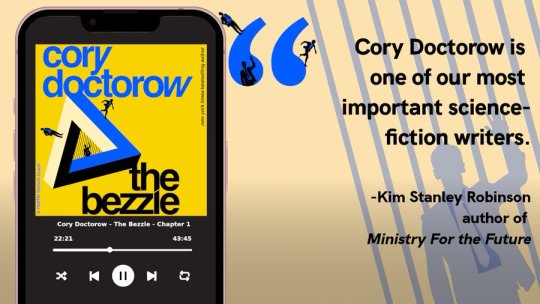
Back the Kickstarter for the audiobook of The Bezzle here!
2 notes
·
View notes
Text

MARDI 23 MAI 2023 (Billet 1 / 3)
Nous venons de recevoir ce document envoyé par un sympathique voisin, très cultivé (principalement dans le domaine des techniques et des sciences), très informé, très bricoleur… et adorable avec nous. Il nous a déjà rendu de multiples services. Cerise sur le gâteau, il a de l’humour. Nous lui avons demandé de qui il tenait ce texte, il a botté en touche. Si ça se trouve, c’est peut-être lui qui l’a écrit… car en plus, il est modeste.
Ce texte est à lire à haute voix, il est tragiquement drôle !
________________________
Une prospective qui circule... et qui, avec ou sans virgules, ne manque pas de nous apostropher !!!
Ce matin de 2035, mon fils de 8 ans m’a fait une crise et a menacé d’appeler le 119 car je refuse qu’il aille à l’école en jupe & avec du vernis aux ongles. Ma fille Julie de 15 ans, qui se sent « non binaire », m’a traité de « boomer » car j’ai refusé de l’appeler « iel » en parlant d’« elle » et parce que je refuse de changer son prénom à l’état civil. Elle veut s’appeler « Jul » pour ne pas qu’on puisse supposer son genre. Et aussi parce que « Jul » est son chanteur préféré.
Je pars au boulot à vélo, car depuis la loi Hidalgo de 2026, la voiture (même électrique) est interdite dans les grandes agglomérations. Je parcours donc 35 km tous les jours à vélo. Avec la chaleur de ce mois de juillet, j’arrive au boulot trempé et décoiffé.
Mais ce n’est pas grave, c’est le cas de tout le monde : ici, personne ne se regarde et personne ne se juge, car c’est passible d’une amende et, éventuellement, d’une peine de prison selon la gravité de la remarque.
Mon patron me fait savoir qu’il m’a mis un blâme car, hier, j’ai écrit un mail sans écriture inclusive et qu’une cliente s’en est plainte. La prochaine fois, c’est la porte ! Il faut que je fasse attention à ce que j’écris et à comment je l’écris. Et aussi à ce que je dis…
Ma nouvelle collègue, qui partage mon bureau, n’est pas là aujourd’hui, car c’est sa semaine de « congé menstruel ». C’est un congé mis en place depuis 2023 afin de permettre aux personnes possédant un vagin (sans distinction de genre, pour éviter d’éventuelles stigmatisations) de rester à la maison, pour motif de règles douloureuses, une semaine par mois.
Grâce à son absence, je peux donc exceptionnellement fermer la porte de mon bureau. En effet, après le mouvement #MeToo, la France a imposé l’interdiction de « portes closes » lorsque des employés de genres différents travaillent ensemble. Certaines entreprises créent même des « espaces safe », c’est-à-dire des bureaux sans aucun homme hétérosexuel pour éviter tout risque d’agression sexuelle.
A midi, pour la pause déjeuner, je n’apporte plus de viande dans mes plats, car j’en avais marre de me faire traiter de « carniste », de « spéciste » ou carrément d’arriéré par mes autres collègues – pour la majorité d’entre eux devenus « végans ». Par ailleurs, lorsque je fais les courses au supermarché et que j’ose m’acheter un rare morceau de poulet à 45 euros le kilo, je me fais systématiquement dévisager par les autres clients, emplis de dégoût.
Le soir, tout en grignotant mon bol d’insectes accompagnés de pousses de soja (bien plus écoresponsable que mon bifteck d’antan), je peux enfin me distraire devant un film Netflix : c’est l’histoire de Napoléon, joué ici par Omar Sy, et Joséphine, sa femme, jouée par une actrice mexicaine dont le nom m’échappe. La parité dans ce film est parfaitement respectée et on apprend, par ailleurs, que Napoléon était bisexuel, afro-américain et musulman. Le film a d’ailleurs obtenu 12 oscars, battant ainsi le précédent record de 11 statuettes, remporté par « Titanic », un vieux film qui racontait l’histoire grotesque d’un couple blanc hétérosexuel, voyageant dans un paquebot de luxe au début du XXe siècle.
Le film terminé, je décide de me glisser dans mon lit pour continuer ma lecture du moment « La Gloire de mon parent n° 1 ». (Pour les plus anciens comme moi, ce livre s’appelait autrefois « La Gloire de mon père », et faisait partie de la série « Souvenirs d’enfance », de Marcel Pagnol).
Je vais, d’ailleurs, bientôt attaquer « Le Château de mon parent n° 2 » qui est la suite du premier. J’ai hâte.
Ne riez pas, on y va en courant…
2 notes
·
View notes
Text
How Tumblr’s Platform Vernacular Shapes Digital Activism and Micro-Publics
Tumblr isn’t just a relic of 2010s internet culture - It’s a living, breathing ecosystem where *platform vernacular* fuels niche communities and redefines digital activism. But how do Tumblr’s unique language and norms empower marginalized voices while navigating the paradoxes of the “public sphere”?

Micro-Publics and the Rise of Hashtag Vernacular
Habermas’s “public sphere” idealizes open, rational discourse, but Tumblr’s fragmented micro-publics - like LGBTQ+ blogs or fan communities - show how digital spaces operate differently (Simpson 2018). Here, hashtags like #BlackLivesMatter or #MeToo aren’t just metadata; they’re rallying cries that shape political discourse (Rho & Mazmanian 2020).
For instance, the #bodypositive movement on Tumblr challenges beauty norms through user-generated selfies and essays, fostering a community-driven counter-narrative to mainstream media (Reif, Miller & Taddicken 2022). These hashtags act as vernacular glue, binding users through shared slang (e.g., “OTP” or “AU”), GIFs, and reblogs - a far cry from Habermas’s text-heavy ideal.

Anonymity as a Double-Edged Sword
Tumblr’s lack of real-name policies creates safe spaces for marginalized groups, like LGBTQIA+ teens, to express themselves without fear of surveillance (Cavalcante 2018). Yet, this anonymity coexists with algorithmic biases. While Tumblr’s reverse-chronological feed *seems* democratic, studies show platforms like Twitter skew political discourse leftward, raising questions about whose voices get amplified (Huszár et al. 2021).

Platform Vernacular in Action: Memes and Fandom
Tumblr’s vernacular thrives on remix culture. Take TJLC (The Johnlock Conspiracy), a Sherlock fandom theory that spiralled into a meta-commentary on queer representation. To be more specific, the video of Sarah Z’s dissection of TJLC highlights how Tumblr’s “shitposting” and roleplay (RP) cultures blend humour with activism. Memes here aren’t just jokes - they’re resistance tools, as seen in political movements like #FreeHongKong, where absurdist humour critiques authoritarianism (Zheng & Li 2023).
youtube
Challenges: Surveillance and Algorithmic Gatekeeping
Despite its grassroots ethos, Tumblr isn’t immune to corporate or governmental surveillance. The Department of Homeland Security’s social media monitoring underscores how “safe spaces” can still be policed (Boyce 2016). Meanwhile, algorithmic curation risks homogenizing discourse - echoing Habermas’s fear of institutional influence.

Conclusion: Tumblr as a Vernacular Public Sphere?
Tumblr’s vernacular - reblogs, dashboards, and niche slang - creates a *participatory* public sphere where aesthetics and activism collide. Yet, its fragmented micro-publics remind us that the digital “public sphere” is plural, messy, and perpetually evolving. As platforms phase out hashtags, Tumblr’s survival hinges on balancing creativity with resistance to algorithmic control.
Reference:
Anselmo, DW 2018, ‘Gender and Queer Fan Labor on Tumblr’, Feminist Media Histories, vol. 4, University of California Press, no. 1, pp. 84–114.
Boyce, GA 2015, ‘The rugged border: Surveillance, policing and the dynamic materiality of the US/Mexico frontier’, Environment and Planning D Society and Space, vol. 34, SAGE Publishing, no. 2, pp. 245–262.
Cavalcante, A 2018, ‘Tumbling Into Queer Utopias and Vortexes: Experiences of LGBTQ Social Media Users on Tumblr’, Journal of Homosexuality, vol. 66, Taylor & Francis, no. 12, pp. 1715–1735.
Huszár, F, Ktena, SI, O’Brien, C, Belli, L, Schlaikjer, A & Hardt, M 2021, ‘Algorithmic amplification of politics on Twitter’, Proceedings of the National Academy of Sciences, vol. 119, no. 1.
Reif, A, Miller, I & Taddicken, M 2022, ‘“Love the Skin You‘re In”: An Analysis of Women’s Self-Presentation and User Reactions to Selfies Using the Tumblr Hashtag #bodypositive’, Mass Communication & Society, vol. 26, Taylor & Francis, no. 6, pp. 1038–1061.
Rho, EH & Mazmanian, M 2020, ‘Political Hashtags & the Lost Art of Democratic Discourse’, pp. 1–13, viewed 16 February 2025.
Simpson, E 2018, ‘Integrated & Alone’, pp. 237–240.
Zheng, Q & Li, M 2024, ‘Foreign Movies and TV Dramas as the Source of Political Argot in an Authoritarian Context: Memes and Creative Resistance in Chinese Social Media’, Critical Arts, Taylor & Francis, pp. 1–19.
#mda20009#PlatformVernacular#DigitalCommunities#HashtagActivism#PublicSphere#TumblrCulture#SocialMediaTheory#MicroPublics#DigitalCitizenship#Youtube
1 note
·
View note
Text
Anthony’s Stupid Daily Blog (1018): Fri 3rd Jan 2025
My first shift of the year. As I woke up this morning the first thing I did was let out a blood circling scream hoping that it would rip open the fabric of time and I could jump through to July this year so I didn’t have to work for seven months before my holiday. The fact that it didn’t work tells me I probably didn’t scream loud enough so tomorrow I’ll get a microphone and a speaker and try it again. Even if it doesn’t hurl me through time the force might cause part of the roof to fall in, land on my head and put me in a coma that I’ll awake from the day before I’m due to leave.
When I rewatched Austin Powers The Spy Who Shagged Me which I would say does still hold up as I was laughing throughout and I appreciate that Mike Myers just decided to go over the top with the silliness and do away with any realism the first film may have had. The joke that still make me howl the most is the one where Powers picks up a cup of Fat Bastard’s shit thinking it’s coffee then exclaims “Corr…This coffee smells like shit”. I can’t explain it but it’s the way Myers emphasises the “T” at the end of shit that makes this dumb line hilarious. There are certain comedians like who have the ability to take an ordinary line and deliver it in such a way that makes it amazingly funny. Rik Mayall was obviously the master of this but I would put Myers in that category too. I think the reason why there hasn’t been a fourth Austin Powers movie yet is because the Bind movies have gotten quite gritty and done away with any of the goofiness from the Bind movies of old that the Powers movies were spoofing. Maybe the plot of the fourth movie should be Dr Evil convince all the women Powers slept with to come forward and accusing him of making sexual advances towards them even after they made clear that they weren’t interested. They could even have a female little person character be one of the accusers and she could be called “Mini MeToo”.
Before bed I started reading Philip K Dick’s The Man Whose Teeth Were All Exactly Alike. Now naturally I assumed that with a title that ridiculous this would be one of science fiction novels but it turns out it’s his final realistic novel before he exclusively switched over to science fiction. I’ve read all of PKD’s realistic novels now and I can certainly see why he decided to focus all his attention on sci-fi because most of his regular fiction books are really boring. This one however does sound intriguing. It starts off with a realtor is showing an old couple around a neighbourhood but when they see his neighbour has a his black friend over they decide not to buy the house. The realtor gets angry at his neighbour for costing him a big sale and the next day when he wakes up to find someone has crashed into his car overnight he blames it in his neighbour which ends up costing the neighbour his job. I assume the rest of the novel is going to be a relentless, bitter game of tit for tat but that being said I’ve still got no earthly clue why it’s called The Man Whose Teeth We’re All Exactly Alike as so far there’s been no mention of teeth at all. I’m hoping that on the final page the last line of dialogue is one of the characters turning to someone and saying “Do you know my dentist says my teeth are all exactly alike”
0 notes
Text


CorpMedia #Oligarchs #MegaBanks vs #Union #Occupy #NoDAPL #BLM #SDF #DACA #MeToo #Humanity #FeelTheBern
JinJiyanAzadi #BijiRojava The US Must Not Abandon the People of Rojava [UPDATES]
While we value the decision of President Obama to support Rojava militarily against ISIL, the administration can do more. The United States must not abandon the people of Rojava for the interests of the regional states who are actually doing very little to fight ISIL…




RELATED UPDATE: Rojava Conflict

RELATED UPDATE: The Dirtbag Left’s Man in Syria

RELATED UPDATE: It has been confirmed as accurate, and you can see in the maps, that around 55% of Raqqa has been taken back from ISIS. The YPJ, YPG, and SDF officially declared the start of the battle for Raqqa city on June 6th, 2017.

RELATED UPDATE: Confessions of a communard: All-in for the revolution

RELATED UPDATE: A new book documents art and resistance in Iran
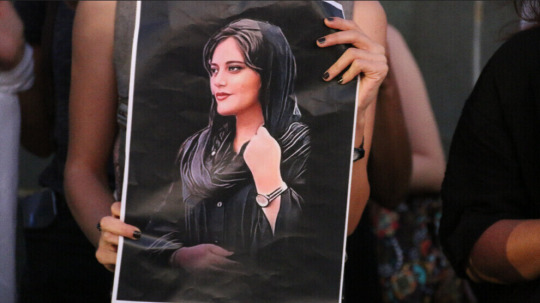
RELATED UPDATE: Iranian authorities stop Jina Amini's lawyer, seize EU Parliament Sakharov Prize
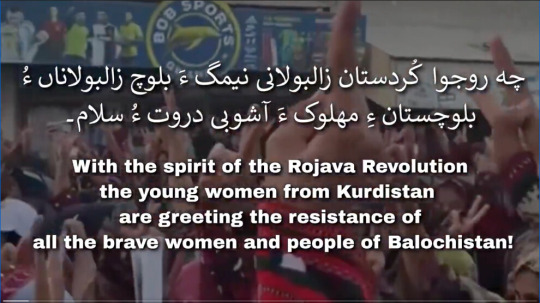
RELATED UPDATE: Women in Rojava express solidarity with the women and people of Balochistan
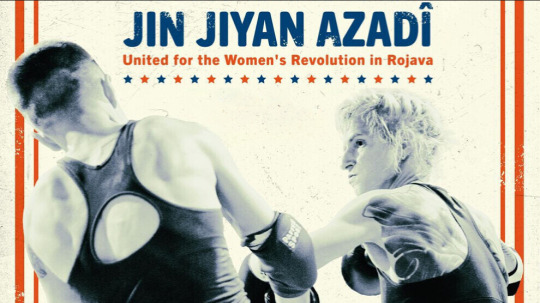
RELATED UPDATE: Thirtysix Fights: Martial arts event for women's shelter in Rojava
FURTHER READING:
10 notes
·
View notes
Text
I used to like this interpretation of her as a gray character, but then the sequel pretty much decided she was just Bad, and outright characterized her as pretty much a wife beater or MeToo case in "volleyball".
Like, I would have left her grey I thought that version of her was more interesting, but that is plaininly NOT what the staff chose to go with.
The moral complexity & sophisticated science fiction/ political aspects were all Ian Quartey-Jones (likely based on his own family's story as an immigrant from Ghana & knowing ppl involved in liberating it), & when he left all that was Sugar's half of it, the heavy handed allegory, feelgoodsy affirmative human drama PSA aspects of it. Which is legit & I understand why they made those choices & in some way SUF made some bold & courageous choices; even if they're not the ones I would have made, its not MY show.
But, like, they did answer the mystery of if PD was good or bad & came down pretty clearly & unambiguously on the "bad" side in SUF.
I used to be a big fan/apologist of her but after "volleyball" I just found the canon version too personally disgusting.
tl;dr: The show was better with both RS and IQJ bringing in their respective stregths.
I feel like enough time has passed since Steven Universe ending to say this: inventing your own alter ego and then launching a war against yourself is an iconic move actually. It's like if Batman and Bruce Wayne had public beef except if entire armies were involved. She really Did That. She said "go big or go home" and then went so big that no-one could ever go home, and then changed the fate of the entire galaxy by faking her own death. She slutted it up bisexually and broke countless hearts along the way. Iconic move after iconic move. Non-stop slaying. A queen an icon a legend. No-one does it like her.
45K notes
·
View notes
Text
Funny Girls: Evolving female narratives in 21st century British stand-up comedy.
Now that it's all over, the Funny Girls critical rationale for your viewing pleasure...
Part I. Introduction
Funny Girls is a multimedia project discussing women in comedy, through a print zine, as well as an online platform. Eleanor Tomsett in her thesis states ‘Stand-up comedy as an art form has emerged from, and been developed within, male dominated spaces’. (2019). This project aims to challenge these patriarchal industry structures and platform female comics, who have continuously had to battle with the stereotype that women aren’t funny, perpetuated by attempts to investigate scientific or philosophical reasons for this as in Christopher Hitchens’ ‘Why Women Aren’t Funny,’ (2007). This project was inspired by the limited research on women in British comedy, and it hopes to prove that these women are worthy of further study and promotion as narratives around gender in comedy evolve in the 21st Century. Additionally, it aims to explore the zine as a vessel for both female liberation and fandom, justifying it as the perfect medium for the subject matter.
In this rationale I will discuss the contextual background of women in comedy, how narratives have shifted in light of the #metoo movement, the importance of intersectionality, and social media’s impact on stand-up comedy. I will explore riot grrrl and science fiction fanzines as notable comparisons to my project in zine history. Further, this rationale will cover the research methods, requirements, and practical output for this project. It will also reflect on the timeline originally set out in the project proposal, noting any changes.
Part II. Conceptual Framework
It is fairly recently that a larger number of academics have begun to delve into the study of contemporary performed comedy, with the first Comedy Studies journal published in 2010. However, the analysis of the place of humour in society, in such works as Taking Laughter Seriously (Morreall, 1983), has been prevalent. Stand-up comedy can be traced back as far as the Middle Ages, to court jesters and fools. In his 1985 article Standup Comedy as Social and Cultural Mediation, Lawrence Mintz describes the ‘undervalued genre’ of stand-up as ‘the purest public comic communication’ and as a ‘vitally important social and cultural phenomenon’ (1985, p.71) – one which has developed significantly since his time of writing, necessitating updated analyses. Mintz additionally observes that American female comics at the time, such as Joan Rivers or Phyllis Diller, were ‘voicing changing attitudes about gender roles […] as a result of the most recent wave of feminist agitation’ (1985, p.75). Indeed, as feminists have become more agitated over the years, it has become evident that the content performed by female comics is often a helpful social commentary on gender roles, whether direct or indirect. Much of the literature on comedy favours discussions about the American landscape, and Tomsett notes that women ‘have been considerably overlooked in existing literature on UK comedy in favour of male performers.’ (2019, p.11). Therefore, this project aims to bring female comics operating in the UK to the forefront.
In recent years, female comedians have become more prominent in the UK, which could be partially attributed to increased visibility on television and in particular comedy panel shows. Lawson & Lutsky’s linguistic study of Mock the Week season five, which aired in 2007 and of seasons 1-14 featured the most women, showed that the five female guests across the season contributed just 4% of the overall words spoken (2016, p.151). This statistic is indicative of the culture around female comics at the time, and industry veterans Victoria Wood and Sandi Toksvig had both criticised the ‘laddish’ nature of panel shows, with Wood commenting that “A lot of panel programmes are very male dominated, because they rely on men topping each other, or sparring with each other, which is not generally a very female thing,” (Khan, 2009). In 2014, BBC chief Danny Cohen announced that, following recommendations from the BBC Trust, the BBC would no longer produce any panel shows that featured an all-male cast (Cooke, 2014). The ‘UK Panel Show Gender Breakdown’ database, created by Stuart Lowe, monitors every appearance on a panel show and categorises them by gender, collating data from 1967 to present (2024). The data indicates a positive trend in the increasing presence of female guests, with significant improvement since Cohen’s 2014 announcement – In 2014 the ratio of male to female appearances was 71:29 and in 2023 this had increased to 62:38.

Another notable shift in the female comedic narrative has been changing attitudes in a post #metoo era. As the culture of women being silenced has evolved, both male and female comedians since 2020 have become much more vocal about issues in the industry. British comedy in particular has seen its own movement pushed forward with the release of Channel 4 Dispatches investigation on sexual assault allegations against Russell Brand. Comedian Lucy Beaumont explains that comedy is rife with predators, as where ‘in any workforce you would go to HR’ comedy doesn’t have a similar structure due to its freelance nature (Chrisp, 2023). Between Katherine Ryan and Sara Pascoe openly discussing these issues in Backstage with Katherine Ryan (2022), and the dramatization of Richard Gadd’s experience with an abuser in the industry in Baby Reindeer (2024) it is clear that this discussion is becoming less taboo. This is indicative of a changing narrative as in sharing their stories women can take control and ensure predatory behaviour is not normalised.
It is true that there has been significant progress for women in comedy, but arguably this success primarily extends to white women. Lucy Spoilar discusses how UK media has set up the idea of ‘the humourless Muslim woman’, essentially doubling down on the notion that Muslim women are oppressed and inexplicably reaching the conclusion that they would therefore not be able to engage in humour (2022, p.75-77). Jessyka Finley asks, in reference to black women in stand-up comedy, how marginalised communities can create art ‘when their aesthetic and rhetorical choices sometimes perpetuate stereotypes’ (2016, p.781). These are just short examples demonstrating that women of colour have to work twice as hard to succeed in comedy as they work against stereotypes and discrimination. Therefore, this project has taken an intersectional approach, prioritising platforming women from a variety of backgrounds.
One recent development for mobility in comedy has been the virality of social media clips. In my interview with Mary O’Connell, she commented on the impact that the pandemic had in this regard –
“We didn’t know what would happen with live so lots of people turned to online content […]. Stuff that works for live doesn’t always work for online and vice versa but I really admire the creativity of the comics who are able to do both.” (2024)
It’s an evolution that has allowed comics to expand their audiences, and in general has attracted more fans to stand-up comedy as a whole. Additionally, it has birthed a new genre in short form comedy, and comedians such as Mawaan Rizwan, Rosie Holt, and Munya Chawawa have actually started out online and later transitioned to live comedy, circumventing the traditional route of performing at smaller circuit gigs. However, some comedians have noted negative consequences of the viral video. As the popular videos on TikTok and Instagram often feature crowd work, new audience members go to shows with the expectation that they are supposed to interject throughout, leading to an increase in heckling (Stahil, 2023). I observed this during my primary research, when attending a work in progress show in which comedian Danny Scott was barely able to get halfway through his set during the allotted time due to the severity of audience interruptions – I spoke with him in the interval, and he expressed that he had noticed more heckling overall and was finding it difficult to deal with. Another issue with these viral clips is that the jokes can age quickly, audiences could be disappointed to hear a viral joke live a year after it was first circulating online. Social media can do wonders for a comedian’s career, helping shows sell out overnight, and massively boosting interest in a way that just cannot happen organically. However, the onus is on new audiences to make an effort to understand and respect etiquette at live events.
Funny Girls as a zine is intended to be reminiscent of the punk riot grrrl era, coming as ‘a direct response to the dominance of straight white men’ originally in the punk scene but here transposed to the British comedy landscape (Darms, 2013, p.7). In addition to being an homage to punk female liberation zines, it is also essentially a fanzine for stand-up comedy. The first British fanzine was a Novae Terrae released in 1936, a print for science fiction lovers. At first the content of these early science fiction zines was serious, or ‘sercon’, but around the 1950s that developed into ‘fannish’, which had more of a focus on fandom (Hansen, 2022, p.7). The traditions of fandom and feminism within zine culture solidified zines as the most appropriate vessel for Funny Girls as a project. Jeanne Scheper notes that whilst zines are an analogue form, the ‘qualities of self-making, self-publishing, and participatory community-building across time and space’ are reminiscent of digital social media platforms familiar to Gen Z and suggests that this may be the reason for their recent resurgence in popular culture (2023, p.22). Based on this, Funny Girls extends past solely a print endeavour, offering a digital extension in the form of a Tumblr blog.
Part III. Methods
My intention had been to conduct interviews with several female comedians, but after reaching out to the comedians featured in the zine, I did not have much success. Mary O’Connell was the only comedian who was able to engage with the interview questions. This lack of response meant that I needed to reconsider my approach to the articles in the zine. Reflecting on this, I should have cast a wider net and explored further avenues past simply messaging on social media. I was quite rigid in wanting to feature these exact comedians, but I should have just messaged a wider range and been more open to including further features. If I were to do it again, I would also contact agencies, promoters, or other industry specialists. It also might have helped to send an example or overview of the zine to show what the tangible product would be and possibly foster more interest or desire to participate.
Despite the setback in securing personal interviews, I was able to engage with the abundance of high-quality text, video, and audio interviews available online. These provided valuable insights and featured a lot of relevant information, giving me confidence that I would still be able to create solid profiles/features for each comedian.
Watching the documentaries ‘Caroline Aherne: Queen of Comedy’ (2023) and ‘Victoria Wood: The Secret List’ (2020) was very insightful in contextualising the evolution of female comedy and pre-2000s influence on contemporary comedians.
Visiting the Glasgow Zine Library was crucial for the development of this project, seeing a diverse collection of zines that followed no defined path was very inspiring. Exploring different styles and themes helped immensely with both the visual development of the zine and with narrowing down content decisions.
Tomsett’s thesis Reflections on UK Comedy’s Glass Ceiling: Stand-Up Comedy and Contemporary Feminisms, previously mentioned, informed much of my practice as one of the only comprehensive studies of women in the British comedy industry.
Part IV. Practical piece
I am really pleased with the final product as it has a strong identity. It is pink, both in reference to the riot grrrl zine ‘I (Heart) Amy Carter’, and as an unashamed embracing of a typical ‘girl colour’ (Dockertman, 2023). The Funny Girls logo is a deliberate feminisation of the iconic Comedy Store laughing mouth, serving as both a homage and an acknowledgement of the patriarchal nature of classic comedy institutions. Later, when deciding how many copies to print, I realised that it could potentially become a copyright issue if I were to distribute it on a wider scale.
Navigating the printing process was fairly challenging, as I wasn’t sure how to choose page weight and finish. Extensive research into publishing standards was undertaken to determine my desired print quality.
I chose to do a Tumblr blog as the extension of the zine, rather than a website as originally planned, because this felt more in line with the homemade spirit of zines. A website felt too corporate and polished and would be more appropriate for a magazine. Tumblr’s posting format offers the flexibility needed to link to external sites, accommodate long-form entries, and share visuals, making it ideal for the project’s needs over other social media platforms.
The relationship between the zine and its digital extension is what distinguishes Funny Girls from conventional zine projects. Where the print zine would be maybe a quarterly print, the blog would serve as a constantly updating real-time archive of supplementary content. I like the idea that some of the audience would find it online as relevant to their interests (zines or comedy) but that a physical copy could intrigue a potential reader who scans a code to find out more and is presented with a wealth of further information. In the future, I plan to review and reprint the zine with no time sensitive information so that it can be circulated without dating quickly.
The incorporation of QR codes modernise the traditional zine format and make it interactive, which I love and think works well – when I visited the Glasgow Zine Library there were many copies that I wished I could’ve engaged with further. I’d hoped to circulate the zines to analyse the data on QR code usage but due to time constraints this was not possible.
A digital version of the zine has also been published via Issuu, a site that allows readers to flick through the pages in the same way as they would if they had the paper copy. This means that double page spreads can be viewed as intended, and any online fans would be able to access the zine content without needing to track down a physical version.
Part V. Project requirements
The zine was created using a combination of Procreate and Canva. Initially, the intention was to preserve the homemade quality typical of zines, but Procreate’s lack of text functionality proved challenging. Handwriting was impractical as it required constant erasing and resizing for edits. Ultimately, I decided that it was worth sacrificing the handmade look and turned to Canva for its familiar interface and useful tools. As my visit to the Glasgow Zine Library exposed me to digitally produced zines with more polished aesthetics, I felt confident that the zine did not necessarily need to look ‘raw’. I created the zine using a magazine template, then ended up having to purchase Canva Pro to resize it down to A5 for printing. This cost could have been avoided if I had more thoroughly researched the printing requirements.
I had also experimented with a free downloadable programme called Electric Zine Maker that offered more artistic options as well as text, which originally felt like a great compromise. The features were excellent, but the programme was only available on laptop or PC, and I found it quite difficult using the art features on a mousepad rather than with a stylus, so did not go for this option in the end.
To complete my primary research, I had to buy a lot of tickets to various comedy shows, ranging from £1 to £20+, along with the associated travel costs. If funds had allowed, I would have liked to attend more shows to better inform my practice. As a lone woman attending often late-night events, I had to also factor in the locations of the gigs in consideration of my safety.
Part VI. Project timeline
The timeline originally set out was delayed a little more than I would have liked. I delayed things in hope that I might get more responses from those I’d reached out to for interviews, as their insights were crucial to the depth of my project. Despite this impact, I feel that I was able to effectively manage the project timeline.
I ended up actually creating the zine in a shorter timeframe than planned, having decided to separate the design process from the content creation. Rather than simultaneously designing and writing, I wrote the content in Word whilst experimenting with designs on the side, then assembled the entire thing at a later stage. This approach streamlined the process and allowed me to focus more deeply on each aspect.
It was actually quite useful that I didn’t design until later, as I ended up using Procreate in another module, the Transmedia Horror strand of Issues in Contemporary Media. This gave me time and space to build on those skills and familiarise myself with the features in the app. When it came to designing the zine, I felt more adept and confident in my abilities, enabling me to complete it quickly.
Throughout the project, I maintained active engagement by consistently updating the Tumblr page and immersing myself in relevant events such as gigs and exhibitions. Additionally, interacting with zine creators online and at the Glasgow Zine Library allowed me to visualise the format before creation. These activities ensured that the project remained at the front of my mind, ready to apply months of primary research when it came to putting the project together.
To keep myself organised and on track, I compiled a checklist covering every single task that needed to be completed, no matter how small. This approach ensured that even when the timeline deviated from the original plan, I could maintain realistic expectations and manage the progression smoothly.
Conclusion
In conclusion, this project has successfully met its aims in creating a multimedia platform for the promotion of female comics operating within the British comedy scene. It has additionally highlighted the possibilities in modernising the zine format in a digital world.
Bibliography
Baby Reindeer (2024). Netflix, 11 April.
Caroline Aherne: Queen of Comedy (2023). BBC Two Television, 25 December.
Chrisp, K. (2023). ‘Lucy Beaumont warned of ’10 male predators’ on comedy circuit weeks before Russell Brand allegations’, Metro, 19 September. Available at https://metro.co.uk/2023/09/19/russell-brand-lucy-beaumont-comedy-predators-19519860/ (Accessed: 1 May 2024)
Cooke, R. (2014). ‘Danny Cohen: ‘TV panel shows without women are unacceptable’, The Guardian, 8 February. Available at https://www.theguardian.com/media/2014/feb/08/danny-cohen-bbc-director-television-tv-panel-shows (Accessed: 29 April 2024).
Darms, L. and Fateman, J. (2013). The Riot Grrrl Collection. New York: The Feminist Press.
Dockertman, E. (2023). ‘Is Pink Still a ‘Girl Color’? An Exploration’, TIME Magazine, 31 August. Available at https://time.com/6309632/is-pink-girl-color-barbie/ (Accessed: 27 April 2024)
Finley, J. (2016) ‘Raunch and Redress: Interrogating Pleasure in Black Women’s Stand-up Comedy’, Journal of popular culture, 49(4), pp. 780-798.
Hansen, R. (2022). Interview by Hamish Ironside. We Peaked at Paper: An Oral History of British Zines, pp. 1-36.
Hitchens, C (2007). ‘Why Women Aren’t Funny’, Vanity Fair, 1 January. Available at (https://www.vanityfair.com/culture/2007/01/hitchens200701) (Accessed: 4 May 2024)
Khan, U. (2009). ‘TV Panel shows are too ‘male dominated’, claims Victoria Wood’, The Telegraph, 9 June. Available at https://www.telegraph.co.uk/culture/culturenews/5478241/TV-panel-shows-are-too-male-dominated-claims-Victoria-Wood.html (Accessed: 29 April 2024).
Lawson, R. & Lutsky, U. (2016). ‘Not getting a word in edgeways? Language, gender, and identity in a British comedy panel show. Discourse, context & media. 13, pp.143-153.
Mintz, E. (1985). ‘Standup Comedy as Social and Cultural Mediation’, American Quarterly. 37 (1), pp.71-80.
Morreall, J. (1983). Taking Laughter Seriously. Albany: State University of New York.
O’Connell, M. (2024). Interviewed by Olivia Jones. 20 April, via Instagram.
‘Predatory Behaviour’ (2022). Backstage with Katherine Ryan, S01E02, Amazon Prime Video.
Scheper, J. (2023). ‘Zine Pedagogies: Students as Critical Makers’, Radical teacher (Cambridge), 125, pp. 20-32.
Spoilar, L. (2022) ‘Comedy, Inclusion, and the Paradox of Playing with Stereotypes: Representations and Self-Representations of Muslim Women in British TV Sitcoms and Stand-Up Comedy’, Dive In, 2(1), pp. 73-93).
Stahil, M. (2023). ‘Is Social Media Killing Stand-Up Comedy?’, Inside Hook, 12 December. Available athttps://www.insidehook.com/internet/social-media-killing-stand-comedy (Accessed: 5 May 2024)
Tomsett, E. (2019). Reflections on UK Comedy’s Glass Ceiling: Stand-Up Comedy and Contemporary Feminisms. PhD Thesis. Sheffield Hallam University. Available at: https://shura.shu.ac.uk/26442/2/Tomsett_2019_PhD_ReflectionsOnUK_edited.pdf (Accessed: 29 April 2024)
UK Panel Show Gender Breakdown (2024). Strudel. [Database]. Available at https://www.strudel.org.uk/panelshows/index.html (Accessed: 29 April 2024)
Victoria Wood: The Secret List (2020). BBC Two Television, 25/26 December.
0 notes
Text
The 4B Movement: Why Some U.S. Women Are Boycotting Men After Trump’s Win

The 4B Movement: Why Some U.S. Women Are Boycotting Men After Trump’s Win In the wake of Donald Trump’s re-election, many U.S. women dissatisfied with the outcome are turning to a feminist movement that originated in South Korea, known as the 4B movement. This movement encourages women to reject heterosexual marriage, sex, childbirth, and dating as a form of protest against systemic misogyny. Origins of the 4B Movement The 4B movement began around 2017 in South Korea, gaining momentum in 2018 amid protests against a surge in spy cam incidents and gender-based violence. It has since evolved into a significant feminist phenomenon, paralleling movements like #MeToo. Recently, interest in the 4B movement has surged in the U.S., with Google searches for “4B” spiking by 450% shortly after the election results, particularly in regions such as Washington D.C., Colorado, Vermont, and Minnesota. What Does 4B Stand For? The term "4B" stands for four Korean phrases that begin with “bi,” meaning "no" in English: - Bihon: No heterosexual marriage - Bichulsan: No childbirth - Biyeonae: No dating - Bisekseu: No heterosexual sexual relationships Participants in the 4B movement aim to boycott traditional societal structures that they believe perpetuate gender inequality. While some may still desire marriage and children, they feel that the risks associated with conforming to traditional gender roles outweigh the benefits. Broader Implications Initially, the movement arose in response to issues such as revenge porn and the misuse of spy cameras targeting women. However, it has expanded to encompass broader concerns, including access to abortion, the gender pay gap, and intimate partner violence. Advocates argue that if violence and inequality persist, they will contribute to declining birth rates as a form of protest. Haein Shim, a South Korean activist, stated that the movement promotes a lifestyle focused on building safe communities and fostering independence from societal expectations. However, participants often face backlash, including harassment and threats, highlighting the risks associated with their activism. The Movement’s Growth in the U.S. As interest in the 4B movement grows in North America, its impact is difficult to quantify. In South Korea, the movement has been linked to a significant increase in women pursuing higher education—nearly three-fourths of Korean women now do so, compared to less than two-thirds of men. This shift has allowed women to envision lives independent of male partners. The movement also coincides with South Korea's declining birth rate, which some attribute to the 4B ideology. President Yoon Suk Yeol has criticized feminism for contributing to this decline, insisting that structural gender discrimination does not exist. U.S. Context and Concerns The re-election of Trump has intensified fears regarding women’s rights in the U.S., particularly following the overturning of Roe v. Wade. Many women perceive his administration as a threat to reproductive rights and other gender-related issues. Trump has framed the elimination of Roe v. Wade as a significant achievement, which has contributed to the urgency felt by many women regarding their rights. Experts warn that the rise of the 4B movement in the U.S. could create further division between genders, potentially exacerbating misogynistic attitudes among men who feel threatened by changing gender roles. Sarah Liu, a lecturer in Gender and Politics, cautioned that this divide might reinforce negative stereotypes and provoke backlash from men. Cultural Differences in the Movement Political science professor Katharine Moon noted that while the 4B movement may gain traction in the U.S., it is likely to manifest differently than in South Korea due to cultural differences. In South Korea, marriage is often viewed as essential for adulthood, whereas in the U.S., the movement may serve more as a temporary means to highlight the precarious situation of women in the face of political changes. Conclusion The 4B movement represents a growing response among U.S. women to perceived threats to their rights and autonomy, inspired by a larger global movement. As discussions about gender equality continue to evolve, the implications of such movements will likely influence societal attitudes and policies moving forward. Thank you for taking the time to read this article! Your thoughts and feedback are incredibly valuable to me. What do you think about the topics discussed? Please share your insights in the comments section below, as your input helps me create even better content. I’m also eager to hear your stories! If you have a special experience, a unique story, or interesting anecdotes from your life or surroundings, please send them to me at [email protected]. Your stories could inspire others and add depth to our discussions. If you enjoyed this post and want to stay updated with more informative and engaging articles, don’t forget to hit the subscribe button! I’m committed to bringing you the latest insights and trends, so stay tuned for upcoming posts. Wishing you a wonderful day ahead, and I look forward to connecting with you in the comments and reading your stories! Read the full article
1 note
·
View note
Text
Mastermind: To Think Like a Killer - Limited Series [2024] on Hulu/Disney Plus
Mastermind: To Think Like a Killer makes you rethink lots of things. From Criminal Minds to #MeToo. Loved every second. Dr. Ann Burgess might be one of the most underrated personalities in all North America. Her work is essential to most of the advances in psychology, studies of serial killers, as well as developing the whole Behavioral Science Unit in the FBI. For anyone who liked Mindhunter…
0 notes